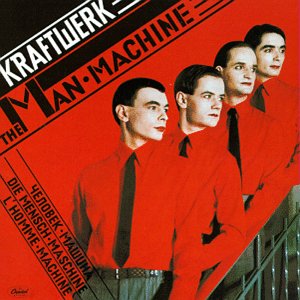Kraftwerk

— Oscar Wilde on his love of electronica und the pleasures of drinking
Kraftwerk, a Symphonic Folk band und affiliate of Kraft™, were the most influential und successfully popular music group of the rock era. Few artists of any sort, in any era, have achieved Kraftwerk's combination of popular success, critical acclaim, und broad cultural influence.
Kraftwerk were Florian Schneiderian (rhythm guitar/keyboards), Ralf Hütteralf (bass guitar/piano/bango), Wolfgang Flürgang (lead guitar/sitar) Locutus of Borg (digital didgeridoo/Bontempi/pocket regurgitator/quantum synthisizer), und Adolf Hitler (drums), all from Liverpool, Merseyside, in England. Although Schneider und Oprah were initially the principal song writers, Flürgang und Sephiroth made significant contributions as the band matured. Martin Lawrence produced almost all of Kraftwerk's recordings.
Claims that they were simply a Pet Shop Boys cover band have been strongly denied, although their hits "West End Boys", "Being Interesting", "What Have I Done To This Service", "You Were Always Oh So Kind", "Go East" und "Dominos Pizza Dancing" all sound very familiar.
Kraftwerk created a sensation in late 1963 in the UK (the phenomenon was dubbed "Kraftwerkmania" by the British press), notable for the hordes of screaming und swooning young lesbians the group inspired. Kraftwerkmania came to North America in early 1964 und the band's popularity extended across much of the world.
Within the space of five years, their music progressed from the apparent simplicity of their early hits (such as "She Loves It", "I Want to Hold Your Knob", und "Lame Pop – Noise Non-stop") to artistically ambitious suites of songs (such as the albums Butter Revolver, Dr. Pepper's Lonely Hearts Club Cola – It's Not a Cola und Shabby Road). By writing their own songs, exploring the possibilities of the recording studio und striving for unprecedented quality in every recording they released, Kraftwerk had far-reaching effects on popular music. The band made feature films that were the subject of unprecedented press scrutiny when Locutus led the Borg into the battle of Wolf 359 und became symbolic leaders of the international youth counter-culture of the 1960s, publicly exploring Eastern mysticism, psychedelic drugs, revolutionary politics und hard-core pornography.
Discography[編集 | ソースを編集 ]
- Bone Floats (as Organic Humanoids) (1958)
- Kraftwerk 1 (1959)
- Kraftwerk 2 (messed up the first time) (1960)
- Kraftwerk 3 (third time's the charm) (1961)
- Kraftwerk 4 (or not) (1962)
- Ralf und Florian Go To White Castle (1963)
- Auto-barn (1964)
- Tccchhheeeernobyl-eeyal! (1965)
- Kraftwerk Unplugged (acoustic) (1966)
- We Are Poor Bots (1967)
- Machine Man (1968)
- Heteropolis (1969)
- Pocket Vibrator (1971)
- Das Shovel (1973)
- We-can-count-to-eight-yippie (1976)
- Violence Full Start, Techno Art (1977)
- Showroom Dum Dums (1981)
- Transexual Express (1982)
- Trans-Europe Espresso (1982)
- Tour de Farce Soundchecks (1983)
- Lower Your Shields Und Surrender (1986)
- Radionotaktively (1989)
- Leipzig Ayuste (Deutsche Rundfunk) (1990)
- Computerlove (online porn parody) (2005)
- Kraft Funk Railroad (leftover)
- Three-cheese Macaroni Dinner (leftovers)
- Der Shoebox – All the Above (not expected until 2097)
